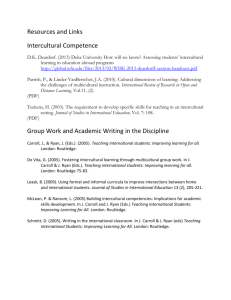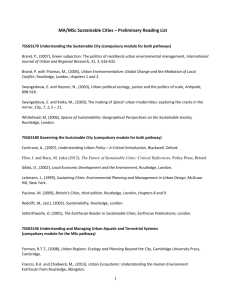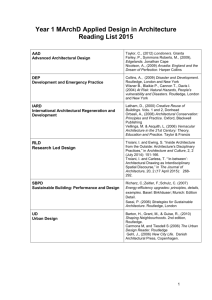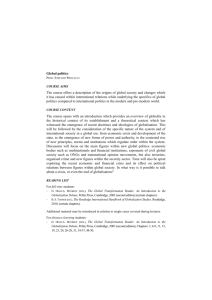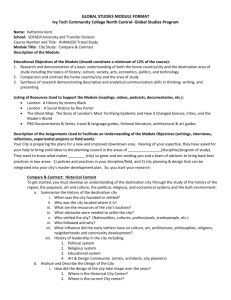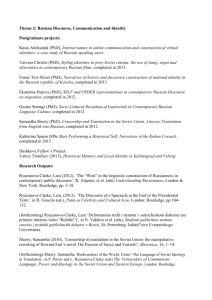Staatswissenschaftliche Fakultät Internationale Beziehungen Dr
advertisement
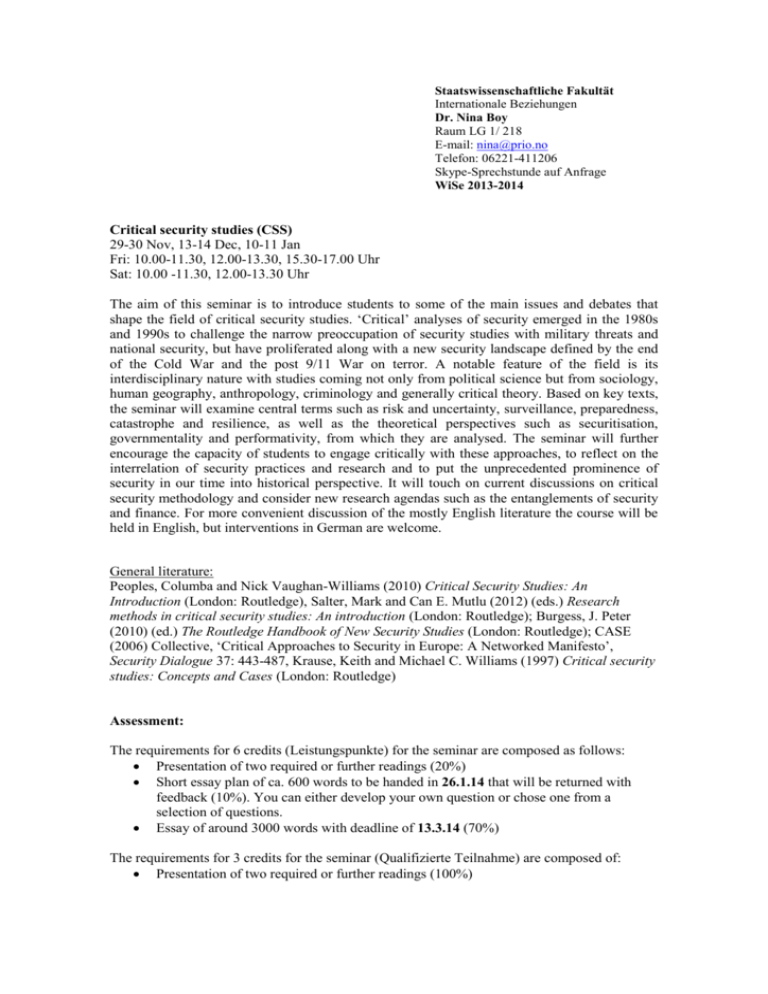
Staatswissenschaftliche Fakultät Internationale Beziehungen Dr. Nina Boy Raum LG 1/ 218 E-mail: nina@prio.no Telefon: 06221-411206 Skype-Sprechstunde auf Anfrage WiSe 2013-2014 Critical security studies (CSS) 29-30 Nov, 13-14 Dec, 10-11 Jan Fri: 10.00-11.30, 12.00-13.30, 15.30-17.00 Uhr Sat: 10.00 -11.30, 12.00-13.30 Uhr The aim of this seminar is to introduce students to some of the main issues and debates that shape the field of critical security studies. ‘Critical’ analyses of security emerged in the 1980s and 1990s to challenge the narrow preoccupation of security studies with military threats and national security, but have proliferated along with a new security landscape defined by the end of the Cold War and the post 9/11 War on terror. A notable feature of the field is its interdisciplinary nature with studies coming not only from political science but from sociology, human geography, anthropology, criminology and generally critical theory. Based on key texts, the seminar will examine central terms such as risk and uncertainty, surveillance, preparedness, catastrophe and resilience, as well as the theoretical perspectives such as securitisation, governmentality and performativity, from which they are analysed. The seminar will further encourage the capacity of students to engage critically with these approaches, to reflect on the interrelation of security practices and research and to put the unprecedented prominence of security in our time into historical perspective. It will touch on current discussions on critical security methodology and consider new research agendas such as the entanglements of security and finance. For more convenient discussion of the mostly English literature the course will be held in English, but interventions in German are welcome. General literature: Peoples, Columba and Nick Vaughan-Williams (2010) Critical Security Studies: An Introduction (London: Routledge), Salter, Mark and Can E. Mutlu (2012) (eds.) Research methods in critical security studies: An introduction (London: Routledge); Burgess, J. Peter (2010) (ed.) The Routledge Handbook of New Security Studies (London: Routledge); CASE (2006) Collective, ‘Critical Approaches to Security in Europe: A Networked Manifesto’, Security Dialogue 37: 443-487, Krause, Keith and Michael C. Williams (1997) Critical security studies: Concepts and Cases (London: Routledge) Assessment: The requirements for 6 credits (Leistungspunkte) for the seminar are composed as follows: Presentation of two required or further readings (20%) Short essay plan of ca. 600 words to be handed in 26.1.14 that will be returned with feedback (10%). You can either develop your own question or chose one from a selection of questions. Essay of around 3000 words with deadline of 13.3.14 (70%) The requirements for 3 credits for the seminar (Qualifizierte Teilnahme) are composed of: Presentation of two required or further readings (100%) PART 1: Conceptual orientations Fri, 29 November 10h-11h30 Session 1: Introduction to critical security studies Krause, Keith and Michael Williams (1997) ‘From Strategy to Security: Foundations of Critical Security Studies’ in (eds) Critical Security Studies: Concepts and Cases (London: UCL Press) Further reading: Walker, Rob (1997) ‘The Subject of Security’ in Krause, Keith and Michael Williams (1997) (eds) Critical Security Studies: Concepts and Cases (London: UCL Press) Guillaume, Xavier (2012) ‘Criticality’ in Mark Salter and Can E. Mutlu (eds) Research methods in critical security studies (London: Routledge) 12h-13h30 Session 2: Security: concepts and subjects I CASE (2006) Collective, ‘Critical Approaches to Security in Europe: A Networked Manifesto’, Security Dialogue 37: 443-487 Further reading: Huysmans, Jef (1998) Security! What do you mean? European Journal of International Relations, 4(2): 226-255 Der Derian, James (1995) ‘The Value of Security: Hobbes, Marx, Nietzsche and Baudrillard’ in Ronnie Lipschutz (ed) On security. New York: Columbia University Press, 24-45 15h30-17h Session 3: Security: concepts and subjects II Kaufmann, Franz-Xaver (2003) ‚Sicherheit: Das Leitbild beherrschbarer Komplexität‘ in Stephan Lessenich (ed.) Wohlfahrtsstaatliche Grundbegriffe: Historische und aktuelle Diskurse Frankfurt/NY: Campus Verlag, 73-104 Further reading: Conze, Werner (1984) ‚Sicherheit, Schutz‘ in Otto Brunner, Werner Conze und Reinhart Koselleck (eds) Geschichtliche Grundbegriffe: Historisches Lexikon zur politisch-sozialen Sprache in Deutschland, vol. 5. Stuttgart: Klett-Cotta Wæver, Ole (2004) ‘Peace and Security: Two Concepts And Their Relationship’ in Stefano Guzzini and Dietrich Jung (eds) Contemporary Security Analysis and Copenhagen Peace Research. London and New York: Routledge, 53-66 Sat, 30 November 10h-11h30 Session 4: Securitisation Balzacq, Thierry (2011) ‘A theory of securitisation: origins, core assumptions and variants’ in (ed.) Securitisation Theory: How Security Problems Emerge and Dissolve. Abingdon and New York, NY: Routledge, 1-30 Further reading: Neal, Andrew (2006) Foucault in Guantanamo: Toward an archaeology of the exception, Security Dialogue 37(1): 31-46 Stritzel, Holger (2011) Security, the Translation. Security Dialogue, 42(4-5): 343-355 Wæver, Ole (1995) ‘Securitisation and Desecuritisation’ in Ronnie Lipschutz (ed) On Security. New York: Columbia University Press, 46-86 12h-13h30 Session 5: Surveillance Lyon, David, Kevin D. Haggerty and Kirstie Ball (2012) ‘Introducing surveillance studies’ in (eds) The Routledge Handbook of Surveillance Studies (London: Routledge) Further reading: McGrath, John (2012) ‘Performing surveillance’ in David Lyon, Kevin D. Haggerty and Kirstie Ball (eds) The Routledge Handbook of Surveillance Studies (London: Routledge), 83-91 Elmer, Greg (2012) ‘Panopticon – discipline – control’ in David Lyon, Kevin D. Haggerty and Kirstie Ball (eds) The Routledge Handbook of Surveillance Studies (London: Routledge), 21-29 PART 2: Beyond risk? Paradigms of uncertainty Fri, 13 December: 10h-11h30 Session 6: Risk and uncertainty I Kessler, Oliver (2010) ‘Risk’ in J. Peter Burgess (ed) The Routledge Handbook of New Security Studies (London: Routledge), 17-26 Further reading: Dillon, Michael (2005) ‘Global security in the 21 st century: circulation, complexity and contingency’. Chatham House Briefing Paper 05/02 Ewald, François (2002) ‘The Return of Descartes’s Malicious Demon: An Outline of a Philosophy of Precaution’ in Tom Baker and Jonathan Simon (eds) Embracing Risk – The Changing Culture of Insurance and Responsibility. Chicago, IL: University of Chicago Press, 197–210 Kessler, Oliver (2007) Performativity of Risk and the Boundaries of Economic Sociology. Current Sociology, 55 (1): 110-125 Bernstein, Peter L. (1996) Against the Gods: The Remarkable Story of Risk. New York: John Wiley & Sons 12h-13h30 Session 7: Risk and uncertainty II Aradau, Claudia and Rens Van Munster (2007) Governing Terrorism Through Risk: Taking Precautions, (Un)knowing the Future, European Journal of International Relations, 13(1): 89–115 Further reading: Cooper, Melinda (2004) On the Brink – From Mutual Deterrence to Uncontrollable War, Contretemps 4 (September): 2-18 Clarida, Richard (2010) ‘The Mean of the New Normal is an Observation Rarely Realised: Focus Also on the Tails’, July. Available at http://www.pimco.com/EN/Insights/Pages/TheMeanoftheNewNormalIsanObservationRarelyRealizedFoc usAlsoontheTails.aspx More literature: http://www.swp-berlin.org/en/projects/transatlantic-risk-governance/additionalliterature.html 15h30-17h Session 8: Logics of catastrophe I: pre-emption Massumi, Brian (2007) Potential Politics and the Primacy of Pre-emption, Theory and Event 10 (2). Further reading: Anderson, Ben (2010) Preemption, Precaution, Preparedness: Anticipatory Action and Future Geographies, Progress in human geography, 34(6): 777-798 de Goede, Marieke (2008) The Politics of Preemption and the War on Terror, European Journal of International Relations, 14(1): 161-185 Sat, 14 December: 10h-11h30 Session 9: Logics of catastrophe II: new knowledge Collier, Stephen (2008) Enacting Catastrophe: Preparedness, Insurance, Budgetary Rationalization. Economy and Society, 37 (2): 224–250 Further reading: Opitz, Sven and Ute Tellmann (2011) Katastrophale Szenarien: Gegenwärtige Zukunft in Recht und Ökonomie, Leviathan – Zeitschrift für Sozialwissenschaft 25: 27–52 Aradau, C. and R. van Munster (2012) ‘The Securitization of Catastrophic Events: Trauma, Enactment and Preparedness Exercises’ Alternatives: Global, Local, Political 37 (3): 227-239 12h-13h30 Session 10: Logics of catastrophe III: resilience Walker, Jeremy and Melinda Cooper (2011) Genealogies of Resilience: From Systems Ecology to the Political Economy of Crisis Adaptation. Security Dialogue, 42(2): 143-160 Further reading: Dunn Cavelty, Myriam and Kristian Soby Kristensen (2007) ‘Introduction: Securing the homeland: critical infrastructure, risk and (in)security’ in (eds.) Securing the homeland: critical infrastructure, risk and (in)security (London, NY: Routledge) Reid, Julian (2007) ‘The disastrous and politically debased subject of resilience’ in Michael Dillon and Julian Reid (eds) The liberal way of war: Killing to make life live (London: Routledge) Dunn Cavelty, Myriam (2012) From Cyber-bombs to political fall-out: Threat representations with an Impact in the Cyber-Security Discourse, International Studies Review, 15(1) PART 3: Current concerns Fri, 10 January 10h-11h30 Session 11: Critical security methods I Mark Salter (2012) ‘Introduction’ in Mark Salter and Can E. Mutlu (eds) Research methods in critical security studies (London: Routledge) Further reading: Aradau, Claudia and Jef Husymans (2013) Critical method in International Relations: The politics of techniques, devices and acts, European Journal of International Relations 0(0), 1-24 12h-13h30 Session 12: Critical security methods II Lobo-Guerrero, Luis (2012) ‘Wondering as a research attitude’ in Mark Salter and Can E. Mutlu (eds) Research methods in critical security studies (London: Routledge) Further reading: Neal, Andrew (2012) ‘Empiricism without positivism: King Lear and critical security studies’ in Mark Salter and Can E. Mutlu (eds) Research methods in critical security studies (London: Routledge) Sat, 11 January 9-10h30 Session 13: Security and finance I de Goede, Marieke (2010) ‘Financial Security’ in J. Peter Burgess (ed) The Routledge Handbook of New Security Studies. London and New York: Routledge, 100-109 Further reading: Boy, Nina, J. Peter Burgess and Anna Leander (2011) The Global Governance of Security and Finance: Introduction to the Special Issue. Security Dialogue, 42(2): 115-122 Dillon, Michael (2008) Underwriting Security. Security Dialogue, 39 (2–3): 309–332 10h-11h30 Session 14: Security and finance II Amoore, Louise (2011) Data derivatives: On the emergence of a security risk calculus for our times, Theory, Society & Culture, 28(6): 24-43 Further reading: Aitken, Rob (2011) Financialising Security: Political Prediction Markets and Uncertainty. Security Dialogue, 42(2): 123-142 Bryan, Dick, Randy Martin, Johnna Montgomerie and Karel Williams (2012) An Important Failure: Knowledge Limits and the Financial Crisis. Economy and Society, 41(3): 299-315 Martin, Randy (2007) An Empire of Indifference: American War and the Financial Logic of Risk Management. Durham, NC: Duke University Press 12h-13h30 Session 15: Wrap up and conclusion
